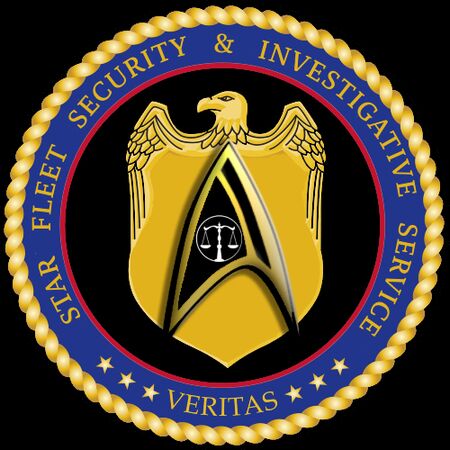SFSECIS PARTNERSHIPS
Home |
Star Fleet Library |
BuPers |
SF Engineering |
SF Intelligence |
SF JAG |
SF Marine Corps |
SF Medical |
SF Records |
SF Sciences
UFP Dept. of Colonial Affairs |
UFP Educational, Scientific and Cultural Org.
& INVESTIGATIVE SERVICE
HEADQUARTERS
STRATEGIC PARTNERSHIP INITIATIVES
PREMISE:
The Star Fleet Security & Investigative Service (SFSECIS) works closely with all other Star Fleet service components to ensure the safety and security of the combined forces. Below are are some key aspects of this cooperation along with potential barriers that could impede those partnerships:
• Shared Jurisdiction: SFSECIS has primary investigative responsibility for crimes involving the Star Fleet and SF Marine Corps. However, they often collaborate with other investigative bodies, like the Star Fleet Security Forces (SFSF) or the Marine Corps Criminal Investigation Division (CID). This ensures a comprehensive investigation, especially for cases that might involve multiple branches.
• Information Sharing: SFSECIS maintains close ties with the Office of Star Fleet Intelligence (OSFI) and operational units. They share information about threats, suspicious activity, and ongoing investigations. This enhances the abilities of all Star Fleet service components to proactively address potential issues and keeps SFSECIS informed about potential criminal activity.
• Joint Operations: SFSECIS and other Star Fleet service components may conduct joint operations for various reasons. This could be for complex investigations, counterintelligence efforts, or deployments overseas.
STAR FLEET LAW ENFORCEMENT/SECURITY UNITS:
Star Fleet Security Forces (SFSF), SFMC Military Police and SFMC CID maintain organic law enforcement and investigative capabilities. Use of other Star Fleet law enforcement personnel for law enforcement and security investigations will be limited to offenses punishable by less than one year of confinement or cases that SFSECIS has declined to investigate. SFSECIS may enter into agreements with other Star Fleet Law Enforcement units regarding investigations into offenses meeting the definition of a significant criminal offense. These agreements however, will not prevent SFSECIS from assuming jurisdiction in the investigation of any offense.
Star Fleet Security and Investigative Services (SFSECIS) – the ‘Detectives’ of Star Fleet, protecting at-risk individuals, investigating criminal, counter intelligence, counterterrorism activities on Star Fleet installations. Similar to the old Terran US FBI or UK MI-5.
Star Fleet Security & SFMC Military Police – The traditional ‘Military Police’ of Star Fleet, safeguarding the lives and property on ships, star bases, and other installations. Often officers have a dual MOS in Ship/Star Base Tactical Systems.
Office of Star Fleet Intelligence (OSFI) – Like SFSECIS, but completely focused and mandated on external operations of espionage in nature. Similar to old Terran CIA, Mossad or MI-6.
COOPERATION:
Star Fleet and the Star Fleet Marine Corps commands, activities, and personnel will comply with requests by SFSECIS Field Agents for information or assistance pursuant to an authorized investigation or operation as if made by the Secretary, including providing access to installations, information and records, in accordance with well-defined laws and regulations.
INDEPENDENT UNIT INVESTIGATIONS:
RETALIATION ZERO-TOLERANCE POLICY:
Star Fleet personnel of all service components, civilian or military, who report acts or omissions to SFSECIS they reasonably believe to be violations of laws or regulations, or to constitute fraud, waste, or mismanagement, will be free from reprisal and retaliation. No adverse action may be taken against an individual who reports, provides testimony, or otherwise assists SFSECIS with an investigation or proceeding in accordance with well-defined laws.
TEMPORARY SFSECIS DUTY:
SFSECIS may request and require to have agents from the SFMC Criminal Investigation Division assigned to SFSECIS for duty as field agents, as well as Star Fleet Security personnel assigned to SFSECIS to support investigative activities. Marine field agents and Star Fleet Security personnel so assigned will carry SFSECIS credentials for the duration of the assignment, conduct criminal investigations under the authority of SFSECIS, and fall under the operational control of SFSECIS.
UNLAWFUL COMMAND INFLUENCE (UIC):
Star Fleet/SFMC unit Commanders, officers, warrant officers, non-commissioned officers and Federation Representatives shall not impede the use of investigative tools, techniques, and technologies deemed necessary and permissible under laws and/or regulations as determined by SFJAG. Failure in this matter is considered a Class A court-martial offense.
Unlawful Command Influence (UCI) is a serious offense in all Star Fleet service components, one which undermines the fair administration of justice. It happens when a superior officer tries to improperly influence the outcome of a legal case, lawful investigation or a court-martial against a subordinate.
There are two distinct types of UCI:
Actual UCI: This occurs when a commander directly pressures someone involved in the legal process, like the SFSECIS Field Agents, the accused, witnesses, or even court members, to get a specific outcome.
Apparent UCI: This happens even if there's no direct pressure. If a commander makes public statements about the guilt or innocence of an accused, or if the command climate creates an expectation of a certain outcome, that can be enough to constitute UCI.
The consequences of UCI can be severe. For the accused, it can lead to charges being thrown out or convictions being overturned on appeal. For the officer who committed UCI, it can result in disciplinary action, including relief of command or even criminal prosecution.UPDATE HISTORY:
SD 3600403 - Created by Michael Dailey
